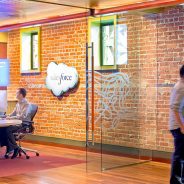Search results for :
How To Begin Your MBA Search, Pt. 3: Recognizing the Best Resources
You can find the first and second installments of our ongoing “How To Begin Your MBA Search” here.
So, you’ve narrowed down the list of business schools to which you’re applying, keeping in mind location, student body make-up, potential networking opportunities, the return on investment, and your professional goals. But while there are an additional host of ineffable qualities that guide a prospective MBA to one program or another, you must also keep in mind the resources of the programs that make up your short list. The importance of these resources will certainly depend upon your own subjective needs, but most potential MBAs will find it necessary to consider the following factors before making decisions on program choices.
Money, Money, Money
Suffice to say, business school is not cheap. Tuition at some programs can soar north of $60,000 USD per year, and unless you are currently working and your employer is chipping in, you will probably worry about how you will pay for school (particularly if you’re out of the workforce). Thus, sussing out which schools provide merit, and finding need-based scholarships is a good method of finding which schools might make the top of your list. And while a significant return on investment is almost guaranteed with an MBA, it goes without saying that graduating with less debt is preferable to graduating saddled with loads of it. Luckily, according to U.S. News & World Report, many more schools are offering such financial assistance, so if you do your research and get busy applying for fellowships and awards, you might be able to lighten the dreaded b-school burden!
I Went Looking for a Job and Then I Found a Job
Hillary Schubach of Shine MBA Admissions Consulting says that potential b-school applicants should ask, “Are there campus resources, student organizations, and activities that align with your interests?” As discussed in the second part of our series on starting the MBA search, while building a network is important, a b-school’s career services resources are also well worth researching. Where are alumni placed? Does the career services office seem robust and well-staffed, and are the advisors in-house or outsourced? These should be pertinent questions to you and any future MBA.
Know Who You’ll Be Learning From
Finally, before settling on any program, identify the professors whom you’ll most likely be learning from, and maybe try to find out more about their teaching style. Stacy Blackman of Stacy Blackman Consulting suggests asking, “what teaching methods appeal to you? Are there particular teachers, courses, fields of study or extracurriculars that appeal to you at certain schools?”
While some of these questions might have been answered when you asked yourself questions regarding where you want to end up after graduation, it is worth reiterating that if you’re unable to learn in certain environments or within certain teaching styles, you won’t be able to achieve your goals as smoothly.
Schubach gives the following advice :
“Core classes and electives that fit your career goals are extremely important. Do your needs align with the academic strengths of the school? Are you looking for a general management program, or one where you can select a concentration in your target field?”
In other words, it isn’t just the professors, but the structure of the program itself that is worth looking at closely— are the core classes suitable to your end goals? Do you need more or less structure in an academic setting?
While it seems like there are an infinite number of factors to weigh when finding the right MBA program, remember that on graduation day, you will want to look back on your b-school experience as one that was well worth it, which makes the questions all the more necessary.
Clark Atlanta Announces New Dean, and More – Atlanta News
It’s time for a newsflash! Let’s take a look some of the biggest business school and MBA news coming out of Atlanta metro this week.
Silvanus J. Udoka Named Dean of Clark Atlanta University’s School of Business — Clark Atlanta News
According to a press release issued by the school, Clark Atlanta University President Ronald A. Johnson announced the selection of Silvanus J. Udoka, Ph.D., as dean of the university’s School of Business Administration. The current professor and chair of the Department of Management will enter his new role on June 1, 2018.
“I am honored to have been selected to serve as dean of Clark Atlanta University’s School of Business Administration,” Udoka said. “The history of the institution and the storied reputation of the School of Business Administration is palpable and the opportunities to create a transformative, innovative learning environment — attributes that first compelled me to pursue this assignment — align with my own mission to produce business and industry leaders who will not only compete successfully within the contemporary business environment, but apply critical thought, analysis and creativity to develop new market paradigms across vast sectors of the global economy. We are going to do great and exciting new things at Clark Atlanta.”
You can read more about Udoka’s promotion here.
25 Alumni Recognized During Emory Entrepreneur Awards — Emory Business News
Last month, the Emory Entrepreneur Network and Emory Alumni Association recognized 25 entrepreneurs Emory University alumni at the second annual Emory Entrepreneur Awards. According to the school, the awards celebrate alumni entrepreneurs who have innovated in their start and industry.
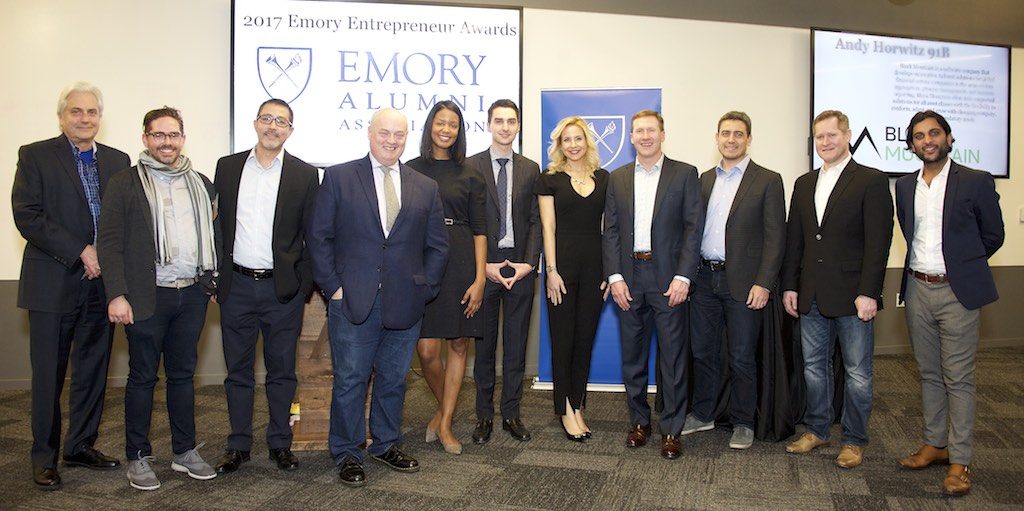
Several of the recent Emory entrepreneur honorees pose during last month’s event / Photo via emorybusiness.com.
“As you’ll see tonight, we’ve got a really good diversity of different folks from different industries and different business that they’ve created,” Steve Greenfield, co-president of the Emory Entrepreneur Network said. “Thankfully, with the support of folks like the Emory Alumni Association and Goizueta, we’ve finally gotten some momentum behind this.”
You can see the list of honorees here.
New Mentoring Program Pairs MBA, Master’s Students With Professionals — Georgia State University Newshub
The J. Mack Robinson College of Business recently launched a graduate mentoring program that helps MBAs build relationships with seasoned industry veterans. The new six-month program matches mentors using an algorithm that examines factors such as industry, years of experience, career goals, and expected outcomes.
“We are employing the latest technologies to ensure our new graduate mentoring program is another way in which we deliver on our vision that ‘no one gets closer to business than Robinson,’” dean Richard Phillips said.
Learn more about the mentoring program here.
These are the Top 5 Contenders for Amazon’s HQ2, According to Bank of America – Business Insider
In non-school news, a handful of Bank of America industry insiders believe that Atlanta can very well be the final destination for HQ2, Amazon‘s much publicized soon-to-be second headquarters.
“Bank of America considered two factors in choosing the cities: how closely each city mirrors Seattle (the site of Amazon’s current headquarters), and how attractive the city’s financial, employment, education, business, housing, transportation, and innovation sectors are.”

Amazon’s Seattle headquarters / Photo via Elaine Thompson/Associated Press.
The company has not yet released details of its pending final selection. You can read more about the industry expert’s predictions here.
What Chicago MBAs Can You Earn the Fastest?
Here’s a lesson everyone learns well before ever stepping foot into business school: time is money.
Some students want to complete their MBA coursework as quickly and efficiently as possible. That’s where accelerated MBA programs come into play: in only 12 months, those who earn an accelerated MBA reenter the job market ready to start their next career.
Accelerated programs— also known as One-Year MBA programs—are designed for students who have clear ideas for what they want to do after graduation, as well as those who already have a strong base in business.
While one-year MBA programs are popular in Europe, they are less common in the U.S. However, several top business schools in the Chicago metro feature accelerated MBA programs.
Let’s take a look:
University of Illinois at Chicago Accelerated MBA Program – Under 12 Months
The Liautaud Graduate School of Business Accelerated MBA launched in fall 2015 and was designed for recent graduates or students with limited work experience to develop knowledge of business principles and skills in three semesters of full-time study.
Students begin the program by taking core courses—financial accounting, corporate finance, marketing, microeconomics, operations management, and organizational behavior—before moving on to advanced electives. Core coursework is completed in a cohort during the fall and spring semesters. The final semester may be completed in the summer semester or in the subsequent fall semester. This degree can be completed in under one year by students who carry a heavy course load each semester.
Kellogg Accelerated MBA – 12 Months
The Northwestern Kellogg School of Management was the first top-tier business school to offer a One-Year MBA program, launching the program more than 50 years ago. The degree option was designed for students who have both a business-related degree and several years of work experience. Fun fact: Kellogg has increased the size of the accelerated program by nearly 20 percent over the past two years.
Kellogg’s Accelerated MBA allow students to bypass core classes. Required courses are taken in the summer, and elective courses taken in the fall, winter, and spring. Students take at least two summer courses in Leadership and Business Strategy, a Crisis Management half credit course right before the fall term, and then join second-year MBA students for the final 13 courses before earning their degree.
Notre Dame One Year MBA Program – 12 Months
Notre Dame University’s Mendoza College of Business’ One Year MBA, located just outside of Chicago on the border of Indiana, begins in May and ends the same month of the following year. The program starts with a 10-week summer session before students join classes with other MBA students in the fall and spring. Summer courses include leadership & organizational behavior, marketing management, and strategic essentials. Following the summer session classes, students declare a concentration in either business analytics, business leadership, consulting, corporate finance, innovation & entrepreneurship, investments, or marketing.

The immersive Mendoza College of Business’ One Year MBA includes international expeditions / Photo via morrisinn.nd.edu
Notre Dame’s One Year MBA also has an international immersion option. Between fall break and Christmas, one year students take a full schedule of MBA courses in partnership with Universidad Catholica in Chile. In addition to business courses in English, students will have the opportunity to learn or improve their Spanish language skills. These class feature numerous travel opportunities for students to explore the Andes region, including trips to Chile’s Atacama Desert, Machu Picchu in Peru, and multi-day trekking in Patagonia. Read more about Mendoza’s Global Opportunities here.
Northern Illinois University One Year MBA Program – 12 Months
Unlike most accelerated programs, NIU’s One-Year program accepts one cohort each winter. Classes begin in January and students finish coursework in 12 months by attending class just two evenings per week. Classes are further broken down into groups, which are expected to meet up at least once per week outside of normal classroom hours.
The program also includes a nine-day international trip, which is usually scheduled in March. These experiences generally include a combination of company visits, government briefings, and university lectures. Recent international immersions have had students visiting places like Lisbon and Barcelona.
Northern Illinois University Fast Trak MBA – 12 Months
NIU is also unique in that it offers two different MBA options that can be copleted in 12 months or less. The school’s Fast Trak MBA is a day-time, 12-month program with required international experiences in Bordeaux, France or Murcia, Spain. Students attend classes Monday through Friday during spring and fall semesters.
NIU’s Fast Trak MBA has all students enter and experience the program together and begins with a mandatory orientation session in mid-August for all students. The MBA program is broken up into five modules, with students taking between two and four courses during these five-to-eight week intensive class blocks. Students enrolled in the program also have the opportunity to earn a second Masters degree in International Management from IAE the Bordeaux University School of Management or a Master of International Management from the ENAE School of Business in Murcia, Spain.
For more information on Chicago MBA programs, click here.
How Toronto Schools Can Help You Pay for Your MBA
Earning your MBA can be an expensive prospect. In Canada, tuition at the most expensive MBA programs can cost more than $100,000 for full-time and part-time students. This can be difficult for some low-income applicants.
So, what are some Toronto schools doing to help offset the cost of tuition, living, and other expenses to pay for your MBA? Continue reading…
How Natural Disasters Can Turn into Economics Disasters – Chicago News
Let’s explore some of the most interesting stories that have emerged from Chicago business schools this week.
Localized Natural Disasters Can Hurt an Entire Country’s Economy – Kellogg Insight
Northwestern Kellogg School of Management associate professor of managerial economics and decision sciences Alireza Tahbaz-Salehi set out to understand the large-scale economic implications of natural disasters.
Tahbaz-Salehi worked with Vasco Carvalho of the University of Cambridge, Makoto Nirei of the Ministry of Finance of Japan, and Yukiko Saito of the Research Institute of Economy, Trade and Industry in Japan. After the 2011 earthquake, “disaster-affected firms’ connections to companies outside the regions affected by the quake had a strong effect: these links accounted for a 1.2 percent decline in Japan’s gross economic output the year after the disaster.”

The aftermath of the 2011 earthquake in Japan hurt economic productivity for a lengthy period of time. Photo via Reuters
Tahbaz-Salehi says, “If these shocks start propagating from a firm to its customers, to its customers’ customers, and so on, they may also have an aggregate effect on the entire economy. But there have been almost no empirical studies to document whether these effects exist and how big they are.”
You can read more from Kellogg Insight here.
Hitting Rock Bottom After Job Loss Can Be Beneficial – Mendoza College of Business
To paraphrase Beckett, “Try, fail, try again, fail again, fail better.” Notre Dame Mendoza College of Business‘ Siegfried professor of entrepreneurship Dean Shepherd recently co-authored a study in Academy of Management Review with Indiana University’s Trenton Williams, which finds that on the road to success, failure is often the most revealing option.
“On the way down, we frantically do all sorts of things to try and repair the situation, and suffer as they fail. Bottoming out frees us from the misconception that the problems can be fixed, and in the process, frees us from other constraints and negative emotions and provides the conditions necessary to find a viable solution.”
He continues:
“‘A failed corporate executive might consider a variety of other potential roles,’ Shepherd says. ‘For example, sitting on the board of a nonprofit organization that is desperate for experienced managerial guidance, exploring government positions or running for office, working with startups, and so forth. Similarly, a failed entrepreneur might explore how skills learned in starting a business could be applied in a corporate setting, take standardized exams to be considered for law school or engage in other low risk exploration activities. In these cases, hitting rock bottom opens up myriad new opportunities.’”
Read more about the duo’s research here.
Would You Pay $20 a Day to Lease a Luxury Car? – Booth School of Business
University of Chicago Booth School of Business associate professor Daniel Bartels and the University of Rhode Island’s Stephen Atlas are scheduled to publish a new study in the Journal of Consumer Research entitled, “Periodic Pricing and Perceived Contract Benefits,” which finds that people “perceive more benefits from their purchases if they make payments on a periodic basis.”

Research from Booth shows that people feel their purchases are more valuable if its paid off in repeated cycles. Photo via NY Auto Show.
“Our framework and results suggest that periodic pricing can help people appreciate the benefits they accrue from a purchase. So, under the right conditions, marketers can encourage purchase with periodic pricing, even for significant sums of money.”
Read more about the duo’s research here.
Misty Johnson Named Business Dean – DePaul Driehaus College of Business and Kellstadt Graduate School of Business
As of March 1, the Driehaus College of Business and Kellstadt Graduate School of Business formally introduced its newest business college dean, Misty Johnson, Ph.D.
Johnson became the interim dean of the business college back in July, replacing former dean Ray Whittington. With her role now official, she has become the first-ever female dean of DePaul’s business school.
“Dr. Johanson has done a laudable job, and I’m pleased the college will continue to benefit from her leadership and expertise,” DePaul University Provost denBoer said in a press release.
“During her tenure this academic year, fall graduate business enrollment increased 16 percent; staff roles were reimagined to enhance the student experience; master’s program and center directors began collaborating more closely to support graduate program success, and the college forged stronger industry connections to support career opportunities. Johanson also launched a campaign with the Office of Advancement to raise $4 million for the college by the end of the academic year and exceeded the goal within the first six months.”
You can read more about the official appointment of Dr. Johnson here.
Our 5 Favorite MBA Podcasts Right Now
Clear Admit recently looked into some of the best business school podcasts out today. Take a look at a few of the premiere productions below.
Many business schools and MBA students have recently begun to produce podcasts, discussing the diverse range of student and graduate experiences as well as current trends and relevant topics in business. These podcasts are unique in that they provide a candid, first-person look at business school from those currently enrolled, allowing for an open platform to discuss business topics outside of the confines of the university. While this is a fairly new trend, there are several different podcasts out there for those who might be interested to learn more. We’ve assembled our five favorite MBA podcasts right now, and we’ll keep an eye out for new podcasts to highlight going forward.
Business Beyond Usual, by Ross Business School Students
One very cool MBA podcast on our radar is Business Beyond Usual, produced by students at the University of Michigan’s Ross School of Business. The podcast tackles a variety of issues of interest to both prospective and current business school students. Recent episodes have delved into topics including:
- Is business education a waste of money?
- Do school rankings actually mean anything?
- If you want to make a difference in the world, is working for a consulting firm selling out?
The podcast describes itself as having no rules or moderators, so those looking for an unfiltered opinion on the MBA experience may be interested in what these Michigan students are doing. With more than 20 episodes in the series already, there’s a wealth of material already for this relatively new podcast. Business Beyond Usual is available on iTunes, Stitcher, and Soundcloud.
Why CBS Podcast
Those looking for an Ivy League perspective may be interested in the Why CBS Podcast, a series for Columbia Business School hosted by Fahad Ahmed, a 2017 graduate of the program. Why CBS features interviews with students, faculty, and alumni who speak candidly about their MBA experience at Columbia, as well as the time leading up to the program and their lives and careers after graduation. Why CBS is currently available on the iTunes Store.
Wharton FinTech Podcast
MBA students at the University of Pennsylvania’s Wharton School have been producing their own podcast, FinTech, since 2015, one of the earliest examples of this fairly recent trend. Boasting a back catalog of almost 50 episodes, this prolific podcast focuses specifically on global financial services, featuring diverse perspectives from CEOs, investors, students, and researchers. This “informative and high caliber” podcast is well-liked by its listeners, offering “a great source of insight into the minds of the founders, investors, and leaders in financial technology,” according to one user review.
Berkeley-Haas Podcasts
While they do not produce a serial podcast like many others, UC Berkeley’s Haas School offers a variety of podcasts and webinars on its website, including several produced by the admissions staff that provide a wealth of information for prospective applicants. There’s a series on financing your MBA, another series of webinars featuring current students discussing the school’s various areas of emphasis, and a third three-part series by Stephanie Fujii, the former executive director of the full-time MBA program, focusing specifically on what the school looks for in its applicants and how best to prepare for your application process.
There’s also a Humans of Haas Podcast produced by students in the full-time MBA program, though most seem to have graduated last year and it’s unclear whether anyone has taken up the reins to continue the podcast going forward. But there are four episodes available on Soundcloud that are worth checking out if you want to get a feel for the school’s students and culture. Each episode focuses on a specific theme and their titles include “Love at Haas,” “Vets at Haas,” “The Politics of Hair,” and “But Where Are You Really From?”
University of Chicago Booth School of Business Podcast
Also of note is the Chicago Booth Podcast Series. This production interviews a variety of CEOs, faculty, and other experienced professionals on a wide array of topics related to current and historical trends in business and finance. Selected archived episodes are available to stream for free on the school website and include diverse topics such as gender and the pay gap, interviews with important historical figures in business, and research on fiscal and monetary legal policy.
These are just a few examples of the many podcasts out there being produced by students and graduates as well as more officially by the schools themselves. These types of podcasts offer a fresh alternative to the often noisy, polluted world of online business commentary and there’s likely a podcast out there devoted to almost any topic that a prospective or current MBA might be interested in learning about.
Inside the Relaunch of the Berkeley Entrepreneurship Association
Entrepreneurship at the Haas School of Business at UC Berkeley is getting an upgrade. Right now the university is working to rebrand and relaunch the Berkeley Entrepreneurship Association (BEA). While the newly updated BEA isn’t available yet, it’s in the works and will have many exciting announcements over the next weeks and months.
We were lucky enough to get an inside look at what’s coming to the BEA in a talk with Luca Cosentino, MBA’19, the President and Co-Chair of the BEA and the man behind the re-launch. Here’s the inside scoop!
MetroMBA: What is the Berkeley Entrepreneurship Association (BEA)?
Luca Cosentino: The Berkeley Entrepreneurship Association is meant to be the one-stop shop for entrepreneurship at Berkeley. Ideally, everything that happens around entrepreneurship should be coordinated or monitored by the BEA. It’s not just for business school, but also for students across the campus. It’s the umbrella under which all entrepreneurship initiatives, partners, mentors, funding, and resources will rest.
The BEA has been at Berkeley for a while as a collaborative effort, and it did a great job before, but we are adding to it. Prior to this relaunch, the BEA focused on one-off events and bringing founders to school. They did a great job regarding inspiring people to entrepreneurship. We want to keep doing what they did—the education side—but add the practical side. In this sense, the innovation is massive.
We are rebranding BEA. We are moving from one-off events to something that the potential to be around for twenty years and could be translated into a core university program matching what the University currently offers on entrepreneurship.
The one thing I want to underline is that is that every university has entrepreneurship programs where you’re matched with other people, but the value here is that we’re connecting people from different schools around the community of entrepreneurship. We are working to build the entrepreneurial community at Berkeley. The value of this community is that it won’t be agnostic to one specific initiative but will serve as an umbrella for all.
MM: Why is the BEA important and what is its goal?
LC: Before getting started with BEA, I spoke to a number of people from different business schools around the country. I wanted to know how each school dealt with entrepreneurship and how it was defined. What I noticed was that there were a bunch of great resources for helping students understand what entrepreneurship is, but it was really hard to find programs that helped students move from zero to one—from a basic idea to “Okay, let me try.” Students have access to many great initiatives where they can brainstorm and talk about their ideas, but to move from an idea to start effectively doing something around that idea is a completely different story.
We believe that if we give business students all the weapons and tools they need to start working from day zero, it’s going to have a massive impact on everyone’s career.
We also noticed that, too often, schools separate skills. For example, the computer science department is separated from the data scientist group and the information group. But we all know that entrepreneurship, great ideas, and great companies come from different skill sets, backgrounds, and diverse teams. We want to encourage that.
A student’s life is busy. Their schedule is packed, so going out and finding people that you like and that you want to work with that are aligned with your ideas is pretty difficult. We want to make this process faster. We believe that this is a great value we’re going to bring to students.
The application of the BEA is very big and far-reaching. There’s a strong impact on entrepreneurship itself, but also for employers and students. We all know that employers are keener to hire people from an entrepreneurial background. There’s a definite advantage for companies who bring on employees who have gone through capitalist discovery, testing, etc. This program really offers 360 degrees of benefits.
CA: What will the BEA offer?
MM: As an organization, we have a few missions starting this year and moving into next year.
-
Encourage Entrepreneurship
Our first mission is to encourage people to start companies. When you think about the typical MBA student who takes two years off to come to school and study, their main goal is to gain more experience and skills. Many MBA students also come to business school because they want to do something different, or possibly, follow their passions. But, when it comes to business school, entrepreneurship, generally, has a less relevant place compared to companies who offer internships or full-time positions. What we’re trying to do is encourage students to start companies and give entrepreneurship a try.
-
Create Entrepreneurial Collaboration
The main innovation that I’m most excited about and what we’re working hard to start in the fall is a program that connects students and individuals from across different schools and different backgrounds. For the first time in Berkley’s history, it will be an initiative led by students and coordinated across different schools. I believe it will be the largest program ever created at Berkeley connecting technical and business students, student clubs, VCs, mentors, funding sources, and institutions.
The goal of the program is to take great ideas and start them along the process, through customer discovery to business model evaluation. The steps are as follows:
- First, the program will allow people to present their innovative ideas.
- From there, the BEA would match the idea to a team of three or four people with different interests.
- Then, over three to four months, that team would work together to gather every resource they need to transform the idea into a workable concept company.
Currently, the program name has not been announced, but it will be released in a few weeks. For now, everything has already been put in place, and Berkeley is ready to launch their first cycle in Fall 2018.
-
Connect the Entire Entrepreneurial Community
The next focus for the BEA is to connect students with startups. There are many students and MBAs who are not 100 percent keen to start their own company but are curious about what it’s like. Our goal is to offer them a part-time experience, while in school, that offers them a unique chance to test their skills in a start-up environment.
Part of this focus will also be to connect the startup ecosystem at Berkeley. That means connecting startups, accelerators, VCs, etc. Already, we have collaborations with many different communities including:
- Participating Clubs: Computer Science Undergrad Association (CSUA), Computer Science Graduate Association (CSGSA), FemTech, Mobile Developers at Berkeley, Data Science Society, Upsilon Pi Epsilon Computer Science Honor Society, and many more coming.
- Collaborations: Xoogler community (community of ex-Googlers), Google Launchpad, Startup Grind, Dorm Fund, Sutardja Center for Entrepreneurship, SkyDeck Startup Squad, Citris Foundry, Food Club, and more.
-
Entrepreneurial Education
Finally, the last thing we’re launching is an educational program that will include courses, a new website, a new blog, and a new podcast (all launching soon) that will include information from entrepreneurs, venture capitalist, product managers, blockchain, and more.
Other educational programs that we will be launching include:
- A cross-schools educational event that we hope will help bridge the cultural gap between students in different schools.
- Life as an Entrepreneur: a seven-week class with a variety of speakers including founders, VCs, etc.
- Educational events around hot technical topics.
Currently, the Berkeley Entrepreneurship Association is still in its early relaunch phase. The newly updated website will be up in the next few weeks so check back on the school website and the Berkeley Haas Entrepreneurship Program regularly to catch its launch.
The Best Long Angeles MBA Return on Investment Bets
Return on Investment (ROI) is one of the most important factors a prospective MBA can take into consideration when choosing the right business school.
Of course, the true value of each MBA program may ultimately be something impossible to measure. The kind of connections made through professional networking, the soft skills that students attain which help them navigate through both their personal and professional life—these aren’t things that can be easily quantified. But, thankfully, factors like average salary increase, rate of post-graduate employment and the overall tuition of a program are. And these numbers can help students start to better see an overall picture of what each MBA is worth.
The Best Long Angeles MBA Return on Investment
The Marshall School of Business – USC
The Marshall School of Business at the University of Southern California is consistently one of the top ranked MBA programs in the state of California and even throughout the country. Specific ROI aside, these sorts of honors should also be a factor when considering the overall value of the program: for example, Marshall has been named the third best program for “Most Satisfied Business School Graduates” by Forbes and sixth on The Economist’s ranking of “Best Alumni Networks.”
Based on tuition for the 2017-18 school year, the total expense (tuition, fees and living expenses included) to pursue a full-time MBA at Marshall would be $95,881 for the first year and $82,522 for the second, for a total of $178,403.
Now take into consideration the fact that the average salary for graduates of Marshall’s full-time MBA program within three months of graduation is $115,309, and that the large majority of job offers (38 percent) for MBA students came from on-campus recruiting or job postings through the university. The second highest source of employment (21 percent) came from internships held while in the MBA program. Furthermore, a number of top organizations—such as Apple, AT&T, and Walt Disney Studios—hired the graduates of Marshall’s 2016 MBA class. All of these factors boost the overall ROI of Marshall’s program, making it one of the top valued programs in L.A.—even with the high price tag.
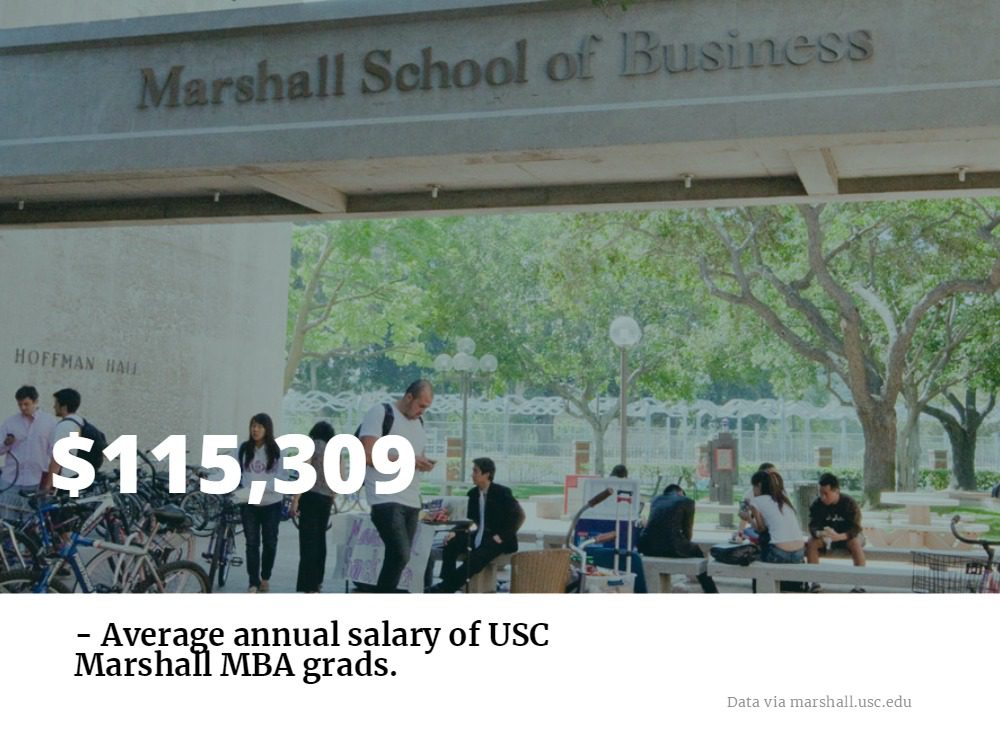
Anderson School of Management – UCLA
The Anderson School of Management at UCLA is another program which offers a high ROI when considering the types of opportunities and salaries available to students after graduation. While the tuition cost is certainly high—roughly $194,220 (including fees and living expenses) for the the two years of the program, the benefits to students are undeniable.
A look at the full-time employment report for the most recent MBA class finds that 92.4 percent of students were offered full-time employment within just three months of graduation, with 87.7 percent acceptances. By far (72.2 percent) , students found their employment opportunities through Anderson-facilitated resources, such as internships, on-campus recruiting, or from UCLA Anderson alumni and classmates.
The salaries for graduating Anderson students also reveals a positive trend: the average post-graduate compensation was $118,150, with 70.6 percent of students earning signing bonuses of up to $89,500. The connections sewn by Anderson internships and alumnae also reveal a significant payoff in the types of organizations hiring Anderson alum: companies like NBC Universal, IBM, Barclays, Google, and other major corporations now have Anderson MBA graduates on staff.
The Paul Merage School of Business – University of California, Irvine
The UC Irvine Paul Merage School of Business is one of the top business schools in the Los Angeles metro area, as evidenced by its consistently high rankings from various publications, such as the Financial Times and U.S. News & World Report.
With the program’s recognition for its high lifetime earnings combined with the relatively low cost the degree, it’s no surprise that that the program at UC Irvine produces a high return on investment. The estimated total annual cost of an MBA at Merage ranges from $67,422—$83,967, depending on if you whether or not you are a resident of California and whether or not you will be using campus. This is compared with an average post-graduate salary of $97,808 for the 2017 graduating class. About 50 percent of all students were employed by graduation, and 81 percent held full-time jobs within three months.
Graziado School of Business and Management – Pepperdine University
One of the reasons Pepperdine’s Graziado School of Business boasts such a high return on investment is the many different formats in which students can pursue a full-time degree. With the opportunity to take the full-time MBA over the course of 12, 15, or 20 months, the Graziado MBA typically costs less overall ($74,250 for the 12-month program, $99,000 for all others) and means less time away from a full-time paycheck.
Combine this with the success rate of 82 percent of students accepting job within three months after graduation and a $120,000 starting salary (at highest), and its understandable why Graziado graduates find incredible value in their degree.
New York News: How Climate Change is Effecting Your Mood, and More
Let’s explore some of the most interesting stories that have emerged from New York City business schools this week.
Climate Change Could Explain the Personality of Your Significant Other – CBS Newsroom
New research from Columbia Business School professor Adam Galinsky, along with Ph.D. candidate Jackson Lu has found a curious connection between the climates to which we grew accustomed as youngsters and our dispositions.
“Ambient temperature can shape the fundamental dimensions of personality. Our research reveals a connection between the ambient temperature that individuals were exposed to when they were young and their personality today. This finding can help explain the personality differences we observe in people of different regions.”
To further study to potential climate differences, the paper’s authors conducted research in two of the world’s most densely populated and geographically large countries: the United States and China. Lu explains the results:
“Clement [mild] temperatures encourage individuals to explore the outside environment, where social interactions and new experiences abound. Venturing outdoors and interacting with lots of people make people more agreeable, conscientious, emotionally stable, extraverted, and open to new experiences. But when the temperature is too hot or too cold, individuals are less likely to go outside to meet up with friends or to try new activities.”
Read more about the duo’s research here.
Launching a New Alumni Initiative – Rutgers Business School
The Rutgers Business School recently launched a new Corporate Alumni Advisory Council to strengthen the engagement between its current students and RBS alumni at marquee companies like PwC, Johnson & Johnson, and Wells Fargo.
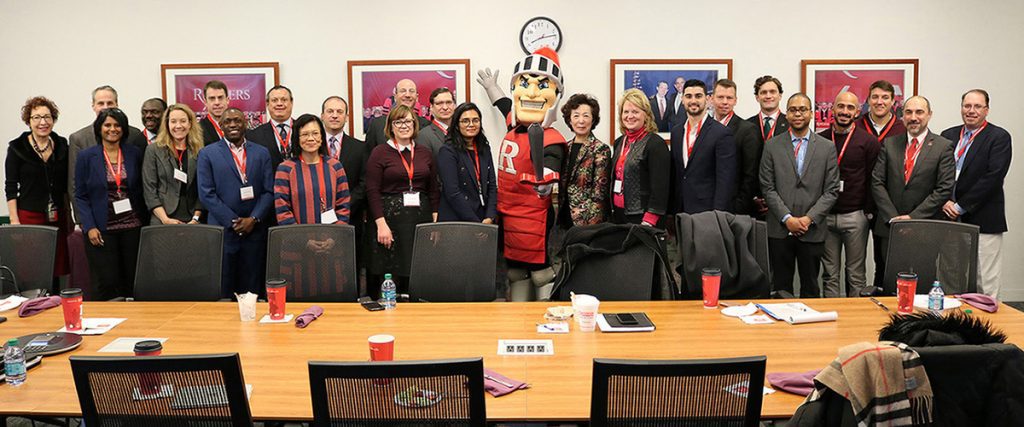
Several members of the brand new Rutgers Business School Corporate Alumni Advisory Council / Photo via RBS
“This is a very exciting initiative with huge potential for networking, lifelong learning and connecting on so many levels that can benefit our alumni, their companies and Rutgers Business School,” said Andrea Cunnell, director of alumni and corporate engagement at Rutgers Business School.
Read more about the initiative here.
Campus Recruiting Hurts Older Workers, Suit Against PricewaterhouseCoopers Claims – Wall Street Journal
In an interview with Kelsey Gee of the Wall Street Journal, NYU Stern School of Business assistant professor Michael North says that as more and more Americans over the age of 65 delay their retirement, certain corporate biases are hurting them. The result of the bias has become the basis of a lawsuit against PricewaterhouseCoopers.
Gee explains:
Attorneys for the unsuccessful candidates—men who applied to PwC dozens of times in their late 40s and early 50s—aimed to convince San Francisco District Judge Jon Tigar on Tuesday that 14,000 older workers were similarly disadvantaged by the accounting firm’s system of finding applicants at university career fairs and school-affiliated job websites, over a four-year period.
You can read more about the lawsuit here.
For the Most Complex Technology Problems, Stevens Research Turns to Nature – Stevens Institute of Technology
Data science expert Dr. Amir H Gandomi, at the Stevens Institute of Technology School of Business, has used techniques from evolutionary computation to gain insight into large-scale optimization and data-mining problems, as well as supply chain management and customer engagement and interaction.
“When you have mathematical solutions to your problems, that’s great, but real-world problems are more complex — they’re nonlinear, mixed variables, large scale, sometimes black box. In these cases, these kinds of algorithms are flexible and adaptable enough to help you find answers.”
Read more about about Dr. Gandomi’s innovative research here.
Here Are The 7 Hardest MBA Admissions Interview Questions
Clear Admit recently explored seven of the hardest MBA interview questions you may encounter, with helpful tips on how to handle them.
We recently shared our list of the most commonly asked MBA admissions interview questions, along with extensive advice on how to approach such queries. In light of the popularity of that piece, we’ve decided to up the ante this time around and spend some time deconstructing the absolute worst, totally unfair, just all-around-tough MBA admissions interview questions.
How did we do this, you ask? We called on three members of our team—all of whom have significant admissions experience at top schools—to comb through our extensive Clear Admit MBA interview archive and hand pick a set of particularly challenging questions. The only ground rule was that they needed to be questions posed to applicants with some degree of regularity, as opposed to one-off, oddball questions from an ‘off the reservation’ alum.
Arriving readily enough at a set of incredibly tough questions, our team of former admissions officers then crafted extensive guidelines on how to approach each one.
WARNING: Some questions on the list appear very sweet and innocent. Be aware that looks can be deceiving.
If you’re preparing for an upcoming interview, you won’t want to miss this valuable insider advice. It can help make answering even the most challenging questions feel like a walk in the park.
The Seven Hardest MBA Admissions Interview Questions
1. Describe a failure in which you were involved.
Why It’s Tough
Most candidates, when preparing for an interview, focus on the positive aspects of their story. They cannot wait to share their successes and highlight their strengths. So when asked directly to describe a failure, they can be unnerved at best and completely thrown at worst, especially if they haven’t given such a question any thought.
Key Considerations
The type of failure, the time frame of the failure and what you learned as a result will all be relevant in terms of addressing the question.
Risks:
- Picking a failure that is really just a veiled success story, i.e. not a real failure. “We missed one deadline (failure) but we shipped an outstanding product (success).” This type of answer can be perceived as avoiding the question.
- Picking a failure that is so substantial, and recent, that the interviewer genuinely worries that you might make the very same type of mistake again—either due to incompetence or because you just simply haven’t had time to learn from it yet.
Planning Your Response
Make sure you prepare to address a real failure that you played a part in and acknowledge your direct role. While the failure should be substantial, it should not be catastrophic to an organization. Address the process you went through in terms of deconstructing the failure and how you have learned from the experience. Finally, discuss a more recent success that demonstrates your use of the lessons learned from the earlier failure.
2. What other schools are you applying to?
Why It’s Tough
Many professionals in the admissions community feel that this question is simply unfair. There are several reasons for this, one of which is that applicants don’t really know how the answer is going to be used (more on this below). In addition, it’s not as though candidates are allowed to ask their interviewer about the other applicants the committee is considering…
Key Considerations
Fair or unfair, let’s unpack the purpose of the question a bit: Is it to determine your likelihood of attending the program you are interviewing for? Is it to assess whether you are ambitious in terms of school selection or more conservative? Is it simply to see if your list of target schools makes sense and demonstrates a thoughtful approach on your part? Any or all of these options are possible depending on the school interviewing you.
In most instances where this question is used, it is being asked by schools that are concerned about their yield. They want to avoid admitting candidates that clearly will select another school when given the choice. That being said, there are admissions interviewers who ask this question merely to better understand your approach to selecting target schools—and to determine whether you are simply applying to schools ranked in the top 10 or have a more nuanced approach. Regardless, you should prepare a solid answer.
Planning Your Response
There are three parts to addressing the question. First, you do want to be honest even if the question feels unfair. Second, as you list your schools, explain why you chose them. You want to demonstrate that your selections are thoughtful ones resulting from thorough research and careful consideration of your career plan, preferred teaching methods, campus environment, etc. Finally, should make the case for why the school you are interviewing with is a very excellent choice among the group of schools you’ve listed—citing specific elements of the program that fit well with the criteria that drove your overall school selection.
3. Describe a conflict at work and your role in it.
Why It’s Tough
It can be hard to discuss conflict without taking sides or painting some of your colleagues (or yourself) in a negative light. It can also be dangerous to highlight a conflict and appear detached from it—e.g. downplaying your role—because that could suggest either that you did nothing to stop it or that you simply aren’t important enough at work to have played a role/taken a side. In short, this kind of question is loaded with “damned if you do, damned if you don’t” issues.
Key Considerations
A common question in an MBA interview will look at how you handle conflict, and usually conflict at work. Schools ask this question to test your emotional intelligence and to see how you talk about your peers, your bosses, your organization, etc. Even the slightest whiff of “throwing someone under the bus” can backfire. It’s also important to showcase your ability to see the various sides of a conflict.
Preparing Your Response
It makes sense to prepare a particular conflict you have had at work and be ready to use the example. A strong response to this question needs to show your role in the conflict, who it was with, how it was addressed (if, in fact, it was addressed) and what the result was. Equally as important will be to share what you learned from the experience and how a subsequent situation at work was resolved positively or avoided altogether as a result of what you learned.
How Can You Score a Job at Salesforce with an MBA?
Salesforce, one of the country’s highest valued cloud computing companies, is actively looking for promising MBA graduates, offering diverse opportunities in tech, business, and sales. Since it’s founding in 1999, Salesforce has been growing wildly, becoming the first enterprise cloud company tor each $10 billion in revenue as of August 2017. And Salesforce isn’t just remarkable for its product’s success—the company was also rated as the “#1 Best Company to Work For” by Fortune.
The Salesforce culture is centered around the idea of “Ohana” (Hawaiian for “family”), and earned its place at the top of the list by offering incredible benefits to its employees—both monetary and mentally. It’s understandable why MBA’s would want a job at Salesforce Ohana, with their focus on helping strong performers find new challenges and opportunities for growth.
What Does Salesforce Look for in New Hires?
Salesforce makes recruiting a priority at every level through their Futureforce University recruitment program. Salesforce offers new hires the same incredible opportunities available to all of their employees—seven days of paid time for volunteering, networking opportunities, and access to the Executive Lunch & Learn and Speaker Series that puts interns and new hires in direct contact with Salesforce leadership.
Because of Salesforce’s focus on having their employees give back to their communities, they seek out new hires who have made a demonstrated impact within their past efforts, whether at school or professionally. In 2015, Salesforce’s senior vice president of global recruiting, Ana Recio, commented on the different ways applicants could make themselves stand out.
“What did you do to differentiate your job from others?'” she said. “What was your absolute impact, your legacy? We always look for people who truly were kind of thought leaders and change agents.”
How to Get Your Foot in the Door?
MBA graduates and current students can apply directly for open roles. Current students will most directly benefit from the company’s MBA internship: a 12-week program that students can pursue during the summer in between years one and two of their program. Each summer, MBA interns are hired in the fields of product marketing, product management, CSG business analyst, corporate development, and data analytics. If recruiters think there might be a good fit, applicants will likely be given a 30-60 minute phone screening, followed by an interview with a hiring manager. Before offering the position, MBAs will likely have to partake in a panel interview/case study, presenting their professional and academic accomplishments.
Salesforce also recruits recent graduates (those who graduated in the last 12 months) in the fields of tech, sales, and business. The precise roles and interview process for each varies depending on the field.
How Well Does a Job at Salesforce Pay?
The majority of hires at Salesforce, both full-time and interns, are for tech-centric positions. However, the company does offer supreme compensation for those with business degree backgrounds—especially those with an MBA.
According to Payscale data, MBA graduates wit a job at Salesforce earn between $85,000 and $160,000 USD annually.
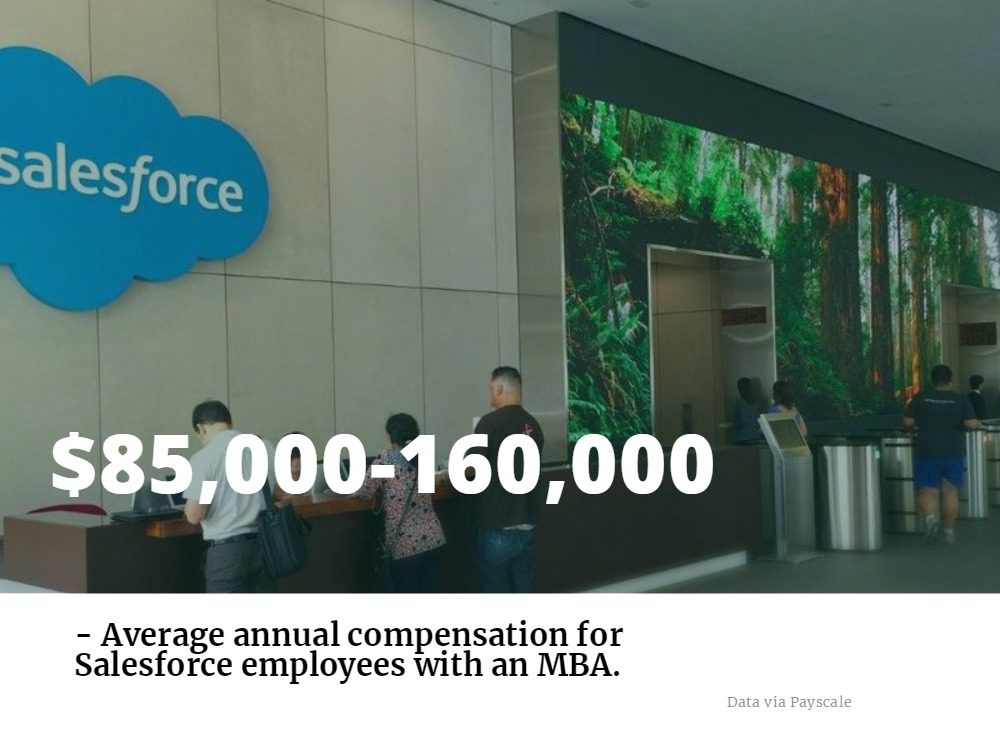
It’s no secret that one of the reasons Salesforce tops the Glassdoor list of “Best Places to Work” is the compensation. Although, as with any position, salary will vary depending on a number of factors, Glassdoor’s compensation of full-time employees shows a lower-end salary range of $60,000-80,000 annually (for account executives and sales engineers) and upwards of $141,000 for senior engineer positions.
What Do Current and Former Salesforce Interns Think?
Danielle, who interned with Salesforce as a product marketing MBA intern, commented on her work experience and Salesforce’s company culture in this video. “Not only am I working on independent projects as part of the internship, but I’m also shadowing people in my team and really seeing what a true day in the life is for a project manager within the app cloud,” Danielle said. “Other internships are very focused on their projects and feel very siloed but here at Salesforce I’m really able to be integrated with the team as a whole.”
Eamon, a software engineer who began at Salesforce as a recent graduate, also commented on his experience. “As a new grad what’s interesting is there really is no pathway you’re supposed to follow, it’s what you make of it,” he said. “It’s the people you go out of your way to meet, the experiences you make, the projects you decide to take on.”
Los Angeles News: Black Panther’s Success, UC Irvine Commencement, and More
We’ve rounded up some of the biggest news coming out of Los Angeles business schools this week.
‘Black Panther’ success amplifies findings of UCLA’s Hollywood Diversity Report – UCLA Newsroom
The immense success of Black Panther, the newest entrant into the Marvel cinematic universe, is pushing against the old Hollywood narrative that diverse casts often hinder the financial success of films, according to UCLA Anderson. Less than two weeks after its debut, the film has already grossed $400 million in the U.S. alone, with gross worldwide sales surpassing $727 million.
According to Forbes, the film is approaching the all-time pantheon of financially successful films:
This puts the MCU action drama’s 11-day domestic total at $411.7 million. Yes, it is already past Captain America: Civil War ($408 million in 2016) and Iron Man 3 ($409m in 2013) to be the third-biggest MCU grosser. And it’s pennies away from topping Wonder Woman ($412.5m in 2017). Once it tops Wonder Woman, presumably by the end of this sentence, Black Panther will be the fifth-biggest comic book superhero movie of all time in unadjusted North American grosses, behind only The Dark Knight Rises ($448m in 2012), Avengers: Age of Ultron ($458m in 2015), The Dark Knight ($534m in 2008) and The Avengers ($623m).
UCLA Anderson points out that the Black Panther box office success underscores its Hollywood Diversity Report, which it explains in full below:
UC Irvine’s Paul Merage School of Business Announces Experian North America CEO Craig Boundy as 2018 Distinguished Executive Commencement Speaker – UCI Paul Merage School of Business Newsroom
The Paul Merage School of Business at UC Irvine recently announced that the 2018 Distinguished Executive Commencement Speaker will be Craig Boundy, CEO of Experian North America. Over 670 graduates will be part of the event, including students from Undergraduate, MBA and PhD programs, as well as the first-ever graduating class of the Master of Finance and Master of Science in Business Analytics programs.
Boundy has a long career in business, with experience in marketing services, decision analytics and customer service. Beginning in a role with British Telecommunications, Boundy has moved through the ranks before joining Experian in 2011 and ultimately moving into the CEO role in 2014. “The opportunity to share my experiences and inspiration with the graduates from the Merage School is an honor,” Boundy said. “Our future success lies in our ability to develop agile leaders ho anticipate disruption and capitalize on creating new opportunities in the marketplace. The graduates from the Merage School are those leaders.”
Read more about Boundy and the Merage Commencement Ceremony here.
USC Marshall Online MBA Breaks Top Ten in U.S. News Rankings – U.S. News & World Report
After some considerable changes to the U.S. News & World Report Online MBA ranking, the USC Marshall School of Business online program jumped to the 8th overall spot—four spots higher than last year.
The school’s Vice Dean for Online Education, Sandra Chrystal, Ph.D, said, “We look forward to sustaining the success of the Online MBA program well into the digital future by maintaining our dedication to delivering an innovative, high-touch, advanced business education to accomplished working professionals who need online flexibility to stay on track while earning their degree.”
You can read more about the USC Marshall online program ranking here.
Interview with John Gilligan: The New Director of the Oxford Saïd Finance Lab
Are you looking to dive deep into finance during your MBA program with the opportunity to interact with banking firms, funds, and industry leaders? That’s the theory behind the Finance Lab at the University of Oxford’s Saïd Business School. Continue reading…
Lehigh Online MBA Ranked Among the Best in the U.S.
Sponsored Content
Lehigh’s College of Business and Economics was ranked on Poets&Quants’ recently debuted 2018 ranking of the best Online MBA programs. Inside the top 10, Lehigh earns the No. 6 spot among the best business schools in the U.S.
For Poets&Quants’ first ranking of online MBA programs, it based its rankings on three core dimensions: the quality of the incoming student, an assessment by graduates of the MBA experience, both the academic and the extracurricular activities, and the career outcomes of the programs’ graduates.
The data was gathered from both school and alumni surveys that included questions on statistics and a wide range of topics regarding whether the program met alumni expectations and if alumni would recommend the program.
The nationally ranked Flex MBA Program provides the flexibility to fit students’ professional and personal needs in an academically rigorous environment and an unparalleled peer group. Students can attend any given class in person or live online. It’s the ultimate hybrid learning environment.
To learn more about the Lehigh University College of Business and Economics Flex MBA program, visit https://cbe.lehigh.edu/academics/graduate/flex-mba.
How Quickly Can You Earn an MBA in New York City?
The time of the two-year MBA is coming to an end. Now, many top schools offer accelerated MBA programs that can be completed in as little as 12 months—with one school offering a nine-month MBA program designed just for business school graduates. So where you can find the fastest MBA degrees in NYC?
For most of these one-year NYC business school programs, the MBA curriculum and experience is similar to that of the traditional two-year MBA but condensed into a more intense 12-month format. These are the ideal programs for business professionals who do not have the time to take off two years of work but want the full MBA experience. Continue reading…
Real Humans of the NYU Stern MBA Class of 2019
Clear Admit recently profiled many of the standout students from the NYU Stern MBA Class of 2019, which you can read below.
New York University’s Stern School of Business got the party started this summer as the first leading business school to share a profile for its incoming Class of 2019. That profile, published in late July, revealed a 4 percent uptick in application volume over the prior year. At the same time, the school admitted significantly fewer students—822 this year as compared to 871 last year—which means that those who got in did so against greater odds.
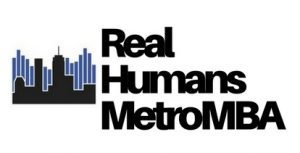
This increased selectivity may have contributed to the rising GMAT scores among those who got the nod. Both average and median GMAT scores increased year over year. The average GMAT score jumped six points, from 710 to 714. The median score increased even more significantly, from 710 to 720. Average GPA, though, slipped slightly, from 3.51 to 3.48.
As the school’s admissions process grew more selective, the enrolled class grew more diverse. The incoming class is 38 percent female, up from 35 percent the prior year. International students also increased to represent 37 percent of the Class of 2019, up from 35 percent in the Class of 2018.
In terms of the work experience they bring with them, more members of the Class of 2019 come from the financial services industry (29 percent) than any other. Another 12 percent of the class came from consulting. Students with government/non-profit, tech, and military backgrounds followed, at 7 percent each.
While some of these statistics hint at both the diversity and the high caliber of the incoming class, nothing brings that to life more than a look at some of the real students who enrolled. We spoke with five of them—drawn from Massachusetts, Texas, Michigan, India, and Lebanon respectively—to learn more about why they chose Stern, how they hope the Stern MBA will help them transform their careers, what advice they would offer to applicants navigating the admissions process right now, and more.
Perhaps not surprising, NYU Stern’s New York City location factored highly into the decision-making process for many of the students we asked. But so too did its community—including how approachable and friendly current students were to prospective students and the school-wide emphasis on IQ + EQ (emotional quotient)—and its curriculum, which has a strong core but also gives students the opportunity to explore electives early on and offers specializations in things like luxury marketing and technology. The reach of its alumni base was also a factor cited by several of the students we spoke with.
Read on to learn more about some standout members of the NYU Stern MBA Class of 2019.
Gies College of Business – University of Illinois
History
The University of Illinois’ Gies College of Business in Urbana-Champaign was originally approved in 1914, then titled as the College of Commerce and Business Administration, and opened in the spring of 1915. The school originally had three departments; in economics, transportation, and business organization. Nearly one hundred years later, in 2003, the school was renamed College of Business. Then, in late 2017, College of Business alumni Larry and Beth Gies donated $150 million to the school, upon which its name was changed once again to the Gies College of Business.
School Rankings
• U.S. News & World Report: 47 (tie)
Location(s)
Gies College of Business is in the twin cities of Champaign and Urbana (total population 129,000) in east-central Illinois. Situated about 140 miles south of Chicago, 125 miles west of Indianapolis, and 180 miles northeast of St. Louis. The university has more than 500,000 living alumni.
The Urbana-Champaign campus is less than 10 miles from the University of Illinois Willard Airport.
Facilities
Gies College of Business operates out of three buildings: The Business Instructional Facility (BIF), Wohlers Hall, and Irwin Doctoral Study. The Business Instructional Facility (BIF) is a state-of-the-art, collaborative space where business students learn and study. The LEED® certified building houses a popular commons area, classrooms, recording studios, Career Services and academic counseling offices, Illinois MakerLab, Margolis Market Information Lab, and a 300-seat auditorium.
Students will attend many of their classes in Wohlers Hall, which features classrooms, an auditorium, and offices for faculty and staff. Wohlers Hall is located across the street from BIF and makes for convenient access for students going back-and-forth from classes. Irwin Doctoral Study Hall is adjacent to Wohlers Hall. It offers private, quiet study room and workspaces for business doctoral and post-doctoral scholars as they pursue their research and teaching activities.
Faculty
The University of Illinois Gies College of Business employs 119 tenured or tenured-track faculty members, and 116 specialized faculty.
Student Body
There are currently 3,140 total undergraduate and students enrolled in the Gies College of Business, and 3,073 graduate students. Of which, 238 are enrolled in the school’s MBA programs.
MBA Degree Offerings
The Gies College of Business offers an online iMBA, as well as numerous Specialized Master’s options.
Los Angeles News: Chapman Alum Returns as New COO, and More
Let’s take a look at some of the biggest news coming out of Los Angeles business schools this week.
Brian’s Journey to COO: An MBA Network That Made Career Aspirations Reality – Chapman University Newsroom
The Argyros School of Business at Chapman University profiled alumni Brian Goodman, whose experience in the Chapman MBA program led him to a role as Chief Operating Officer.
Goodman, who had been working as a corporate attorney, entered Chapman’s EMBA program in the fall of 2015, quickly taking advantage of the many networking opportunities the program offered. It was through one of these MBA-association events that Goodman met Robin Follman-Otta, who would ultimately help shape his career by offering him the COO role at her firm, Markall Incorporated and RA Industries. Although Goodman never expected finding himself in the manufacturing industry, he joined Robin’s company shortly after his May 2017 graduation and has found it a perfect fit. He credits the Chapman EMBA program with providing him both the professional network and experience to make crucial progress in the business world.
Read more about Goodman’s experience at the Chapman EMBA program here.
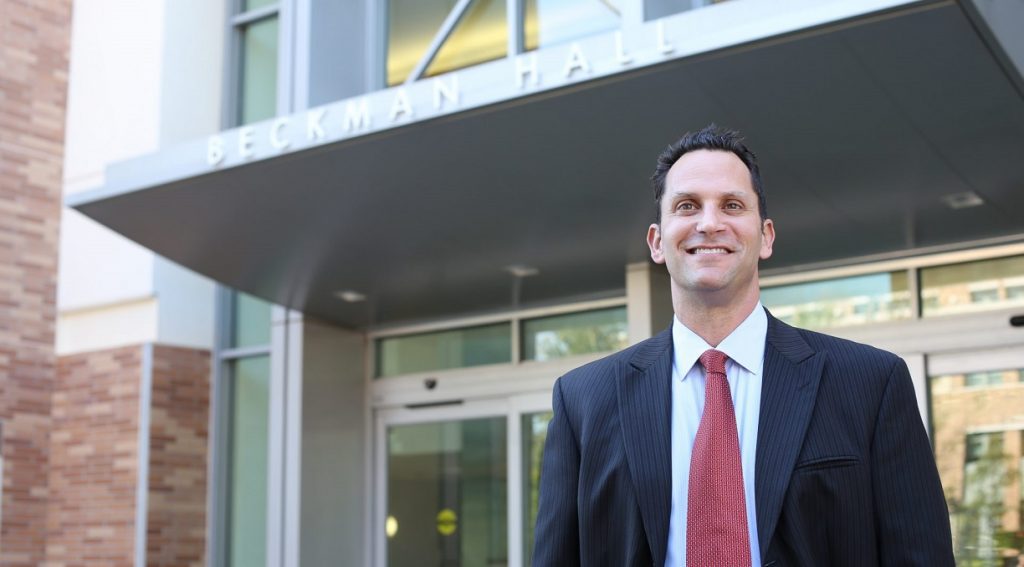
Brian Goodman, the new COO of the Chapman MBA program / Photo via blogs.chapman.edu
Center for Women in Leadership Hosts Outreach Conference – Pepperdine Newsroom
The Graziado School of Business and Management at Pepperdine University recently hosted the Women in Leadership Reachout Conference on February 13 in Malibu. The day-long event involved discussion panels revolving around issues that impact women in business, such as moving through male-dominated fields, work/life balance, and strategies and goals for mentorship.
“The conference brought C-suite level women to our campus to share real-life stories of making it to the top and thriving once you get there,” said director of the Center for Women in Leadership and Graziado professor Bernice Ledbetter. “Audience members were given a once-in-a-lifetime opportunity to learn from some of the top women executives in the nation.”
The event was presented as a partnership with C200, which also presented $10,000 scholarships to three exemplary female MBA students.
You can read more about the Women in Leadership conference at Graziado here.
How and Why Cal State Fullerton Students Launch Companies Before They Graduate – The Orange County Register
The Orange County Register recently took a deeper look into the New Venture Creation and Funding class at the Mihaylo College of Business. The program, which has about 200 majors, encourages students to create startups even before graduation day—with the full support of mentors and faculty at Mihaylo. The program centers around the idea of the “lean startup,” which looks for market input early on in development. After students have created their pitch, a panel of investors hear their ideas and often are so inspired they offer funding on the spot.
Successful companies from past entrepreneurship students have included a local craft beer maker Bootlegger’s Brewery; a tutor service which helps connects students with tutors who have been through the same class, Wecademi; and an online piano lesson service called Piano with Johnny.
Read more about the Mihaylo entrepreneurship program here.
These LA Business Schools Are Helping Low Income Students Pursue Their Dreams – MetroMBA
Last week, we profiled several schools in the Los Angeles metro area, including the UCLA Anderson School of Management and Marshall School of Business at USC, which provide ample opportunities for in and out-of-state prospective MBA students that need financial assistance with their education. As well, we highlighted many of the offerings available to military veterans.
For low-income MBA applicants who also have a history of military service, there are many unique financial aid opportunities. The exact services available will depend on the school, but some of these programs are available at schools across California and the U.S.
First, there’s the Yellow Ribbon Program, which many Los Angeles business schools take part in, including Chapman University Argyros School of Business. This program awards MBA students up to $6,000 for tuition and fees. Another program open to military veterans is the Post-9/11 GI Bill, which includes payments directly to the university for tuition and fees, a monthly housing allowance, and an annual books and supplies stipend up to $1,000 per year.
Individual schools like the USC Marshall School of Business also offer their own specific scholarships for military veterans. The Schoen Family Scholarship Program for Veterans is available to full-time MBA students at Marshall and has, to date, provided a staggering $1.2 million in financial support to 173 students at the university.
You can read more about the financial opportunities for lower-income applicants here.











